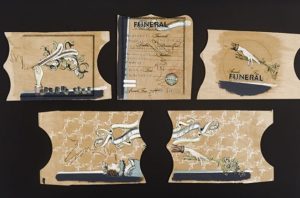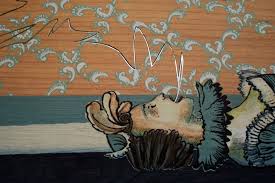One of the most influential records of the early aughts begins in the middle of a sentence. The first word we hear, disorientingly, is “and.” We aren’t sure whether we’ve stumbled upon a conversation that precedes us, or whether Arcade Fire frontman Win Butler has occasioned us as interlocutors––nevertheless, the story that we are about to hear possesses its own history, an invisible prologue. There’s more life than that which we have access to in the span of the band’s 10-track debut LP, Funeral. Universally beloved, critically acclaimed, timeless. It’s no wonder a record about aging has aged so well.
The opening track, “Neighborhood #1 (Tunnels),” begins with this, the now-famous conjunction: “And if the snow buries my / my neighborhood…” The conditional demands a conclusion, but Butler delays our satisfaction for a few seconds more, continuing the list of ifs. “And if my parents are crying…,” he says, before jumping up an octave and finally belting, “then I’ll dig a tunnel, from my window to yours.” With a cymbal crash, the drumkit drops in, a fortifying heartbeat beneath the down-strumming and organ. The piano at the beginning is as recognizable and transportive for a generation of fans as an old alarm clock.
It’s a song about being young, about the urgency of connection when everything else seems, somehow simultaneously, too big and too unimportant. Adults seem to have their priorities all askew. The imagery in “Tunnels” anticipates Suzy and Sam in Moonrise Kingdom, fleeing their beds in the night to meet in the middle of the field. So many other kids, in love or not, longing to flee the Draconian strictures of parents and teachers and civilized society, to escape to a place they can let their hair grow long and forget all they used to know. But it isn’t a song that takes place in the instance of youth; it’s a song about how it felt to be young. Though seemingly inconsequential, the perspectival distinction is what’s compelling. Nimble storyteller this speaker is, he switches between past and present tenses to reveal that we aren’t watching two kids conduct a clandestine romance; we’re listening to a grownup lament a theoretical life they didn’t live. That the narrative is conditional retrospection suggests a childhood that could have, but didn’t, take place. It’s not a song about transience. It’s a song about nostalgia and regret.
There’s a verbal stutter in his recounting; the revolving retrogression of syntax winds like a lapsed memory, he’s remembering, and returning, and returning. “Meet me in the middle, the middle of the town”; “We forgot all the names that the names we used to know.” The sentences lap like waves on top of themselves before easing forward up the shore. While there’s an excitement in this progress, anticipatory tension in the narrative, the cumulative ebbing, and flowing of tides gradually recede shorelines. This is erosion. One day, there will be no beach left. One day, Butler will sing five years later on “Half Light I,” they will see it’s long gone. Each time we access a memory, we tarnish the pure source. Like removing an old film photograph from a box in the attic, exposing it to the light to look at it. What good is having a photograph no one sees? But the act of looking is what causes the damage. Ergo the paradox of retrieval.
Like the protagonist in Arcade Fire’s extended visual album Scenes from the Suburbs laments, “Sometimes the way [things] are now changing the way I remember [them]. Sometimes it doesn’t.” Objectivity is emulsified by emotion. Childhood is enlarged by longing, blurred by time. “You change all the lead, sleeping in my head. As the day grows dim, I hear you sing a golden hymn.” His affection corrodes that which is heavy and hard and impenetrable. Lead into gold. Rosy-hued.
As the song goes on, and his frustrations with the banalities of adulthood metastasize, his voice tightens, evoking the gasping ferocity of Paul McCartney’s “Golden Slumbers”––another song about homesickness, rife with remorseful wist. Butler bellows, “But sometimes we remember our bedrooms, and our parents’ bedrooms, and the bedrooms of our friends!” We’re in the present again. The always-present, immortalized in the studio recording. This speaker, no matter where and when he reaches us across the airwaves, he is remembering, and we are remembering with him. As he remembers his parents, the instrumentation intensifies, Jeremy Gara’s drumming is more furious, the chorus more urgent than before, anxious with mortal dread. As the day grows dim, he feels everything slipping away. And so do we.
In the outro, Butler begs for purification, but it’s unclear whether what he wants is truth or absolution. Whether purity of mind is clarity or forgetting. Either way, it would seem he desires to return to the white silence of snow. After all, the album is rife with the elements in conflict—the ice storm of “Power Out” is melted by the immolation and stovetop of “7 Kettles,” the spark from “Crown of Love,” lightning in “Wake Up,” and “Backseat.” The matter of creation is also the matter of destruction.
The band’s preoccupation with memory and coming-of-age appears across every record they put out but culminated in The Suburbs (celebrating its 10th anniversary this past weekend), their concept album about a suburb under siege. They partnered with filmmaker Spike Jonze (who capitalized on the sentimentalism of “Wake Up” for the trailer of his 2009 Where the Wild Things Are adaptation) to develop the eponymous short film. The narrator, a teenage boy, reflecting on one pivotal summer with his friends, says, “I wish I could remember every little moment, but I can’t.” He rails against the curious and inauspicious banality of it all, “Why do I only remember the moments that I do?” I’m not sure he, or the band, ever found a satisfying answer. Often the truth is simple: what we remember is that which is most painful, that which we would sooner forget.
Between 2001 and 2004, during the recording of Funeral, the members of Arcade Fire collectively lost nine people they loved. Parents, grandparents, aunts and uncles, friends. They flitted from recording studio to mortuary and back again, grieving, creating, grieving, creating. Founding members Régine Chassagne and Win Butler married in the midst of the macabre chaos. All around them, the country struggled to cope with collective grief. It was the wake of 9/11, the dark dawn of the war in Iraq. Unrest in Haiti, Régine’s motherland, about which she writes track #8, a mournful and morbid political ballad. The specter of death hadn’t yet disencumbered the cities. The news was black and white and red all over. Public and private trauma pooled together. And through the ashes came the album.
Funeral is a symphonically explosive and singular chamber pop marvel, defining the next generation of indie rock, boisterous and defiant, and luridly obsessed with death. After all, a funeral is a party.
But the revelry of Funeral cannot hold and bares its latent pain at the album’s center. At the end of the fourth track, the dancey post-punk-revival anthem “Neighborhood #3 (Power Out)” whose powerful open-strumming and crescendoing percussion owes lineage to rock’ n’ roll greats like Morrissey and Robert Smith, Butler yells, exhausted, “Where’d you go?” and, the record, seemingly having also expended the last of its vigor, slumps to its energetic nadir. Following “Power Out” is the frank, dreamlike “Neighborhood #4 (7 Kettles).” With none of “Wake Up” ‘s instrumental enormity or “Une Annee Sans Lumieres optimistic coda, the languid meditation on patience gestures toward the reality of grief: that, sure, it can be instructive or generative or revelatory or rapturous, but most often, in its rawest state, grief is exhausting. Grief is weariness. Grief is the moment before the collapse, the ache to be a child and free from responsibility, to be held, to lie down. For a moment, during the procession of riotous elegies, the band rests.
Nevertheless, as Butler will remind us later on, sleeping is giving in, no matter what the time is.
“7 Kettles” begins with a flurry of strings, creaky and baroque, that coalesce into a single chime: a whistling tea kettle. From the cacophony, a repetitive fingerpicking pattern emerges, one whose hypnotic monotony is simple and straightforward enough to be a lullaby, tidying the discord. The same progression persists, unvarying, straight through to the end. The steaming kettle never reaches its climax. Instead, it fades into Win’s voice, soft and uncharacteristically brittle. He sounds beaten down, shirking the might of his diaphragm in favor of fragility. “Time keeps creeping / through the neighborhood / killing old folks, waking up babies / just like we knew it would.” He isn’t complaining or protesting so much as stating the nature of things: they’ll end. Impermanence is latent in creation.
Antigone laments to her sister, “We begin in the dark, and birth is the death of us.” (Butler sings: I woke up with the power out.) “Who said that?” Ismene asks. (Is it a dream? Is it a lie? I think I’ll let you decide.)
Immanent in subjectivity is skepticism about the “provable universe.” The self must be exempt from the rules that govern the other. We feel, consciously or otherwise, that if we can understand death, really truly understand that we are going to die, we’ll have mastered the lesson our own transience threatens to impart. It’s less a conviction than an itch––the incarnate lurking suspicion that enlightenment isn’t merely the acquisition of knowledge, but the acquisition of immunity. Our egos personalize mortality, and we fancy ourselves special cases, but we aren’t. It is impossible, by the very nature of consciousness, to imagine nonbeing. It is not an experience we have ever consciously known, or ever will; it exists beyond the perimeter of sentience. We cannot escape the phenomenological predicament of being alive.
Still, we must remind ourselves, as Butler tersely stated when asked during Funeral’s recording process to describe his life philosophy in fewer than ten words: “Death is real.” (Ahem, Phil Elverum.) Death is the only certainty. Ours, that of our parents, our children, everyone we know and love, and everyone we don’t know and don’t love.
If time is the mechanism by which mortality operates, then one cannot perceive linear time without also confronting its unswerving march toward oblivion. We derive the expression’ time flies’ from the Ancient Greeks, who would inscribe Virgil’s words––fugit inreparabile tempus––on sundials, and more often, gravestones.
To perceive time is to perceive its finitude, and yet, when one is waiting (“til I don’t know when, cause I’m sure it’s gonna happen then”), turning one’s attention to the unbearable now––that curious, static expanse of want and lack––time seems at once mockingly elusive and everlasting. If you are riding in a car, and another car drives alongside you at the same pace, you cannot see that the other vehicle is moving. We cannot escape our enmeshment in the present. Existing in time prevents us from detecting its shape; any point on a graph is infinite in isolation. On waiting: “I have no sense of proportions,” writes Barthes.
The Proto-Indo-European root ten (of which tem- is derivative) meaning ‘to stretch’ is presumed to be the basis for words related to time, tempus. Since antiquity, the time has been that which stretches or is stretched. Relativity precedes physics.
We will spend our whole lives waiting for things. Each will come and go. We will find new goalposts. We will distract ourselves, and then we will die.
“They say a watched pot won’t ever boil,” Butler sings, opening the first chorus of “7 Kettles.” “Well, I closed my eyes, and nothing changed, just some water getting hotter in the flames.” Despite subjective relativity, our relationship with time is unidirectional. Time, like an apathetic god, is indifferent to our perception of it.
Nearly three minutes into the song, the kettle starts whistling again, but again, as before, it never seems to peak; the pitch steepens like a breath blown against the rim of a glass bowl and sublimates into the wind. We are kept in standby and then dismissed. The refusal to offer catharsis, to let the kettle crescendo and be snapped open, suspends the listener in the liminal space, the waiting room, that the speaker inhabits. Fated to oscillate between human frustration with mortality and acceptance of one’s cosmic insignificance, in perpetuity. I don’t want to die! is followed closely by, The world will go on without me. Time moves past us. Wherever that offers comfort, it also brings sadness. We can rationalize our smallness, but we cannot escape the fact of existing in a body.
The song is lush with similar paradoxes, reversals, surprises; the speaker’s “eyes are covered by the hands of [his] unborn kids,” inverting his parental role as protector. “But,” he continues, “my heart keeps watching through the skin of my eyelids.” These visceral references to specific parts of his flesh, nearly slipping into abjection, suggest that despite any motion toward the sublime, his body cannot unknow the truth of its doomed frailty. The body feels and sees, smells, tastes, hears, all the unmentionable phenomena the consciousness refuses to. Coming to terms with the reality of being embodied necessitates seeing its limitations. To make peace with one’s restraints, one must press against them to feel their edges.
“Gotta give it time,” he sings, and just like they began, the strings spiral out as the song ends, unspooling back into disorderly squeaks. And to dust…
Antithetical to the understated solemnity of “7 Kettles,” the song for which they are best known, with nearly 86 million listens on Spotify, praise from David Byrne, a heart-rending David Bowie duet, and a digital role on U2’s Vertigo tour, “Wake Up” is a pyrotechnic explosion of hope. The tsunami of triumphant horns and cymbal crashes features––in addition to the band’s six-piece core touring lineup, helmed in this case by Butler’s 12-string electric guitar––a symphony of synthesizers and strings; accordion, violin, cello, French horn, and a harp that scales the tail of every verse, decisively earn the band their canonical Hard Times satire piece (“Arcade Fire to Lay Off 400 Nonessential Members by 2021”). “Wake Up” is a song whose initial jolt of electricity somehow never diminishes in returns. Instead, it rewards relistening, fortifying a palimpsest of all the contexts in which you’ve heard it. It distills listens, collecting memories rather than tarnishing them.
“But now that I’m older,” Butler sings––and we are, too, older than the time we last heard these words, much older than the first––”my heart’s colder, and I can see that it’s a lie.” Every listening occasions a new reckoning with our previous naïvété, creating a scale for measuring our growth, revealing flaws in previous interpretations and applications of Butler’s sentiment and our own beliefs, nudging us further into the future. Displaying the fullness of his upper register, these epiphanies, achingly belted, are monumental. Rather than “7 Kettles”‘ rejection of catharsis, “Wake Up” climaxes over and over and over again, like a firework show. Sans chorus, the song explodes into a series of oohs after every verse. There’s a peak of triumph in every note, at the end of every couplet, every time Butler elongates a vowel or flips a key. Perhaps what we’re waiting for will come again and again, and leave us, again and again. Perhaps one need not ever lose their wonder. And perhaps there are some things whose rapture will forever herald new firsts.
The album closer, “In the Backseat,” is a real elegy. It opens with twinkling synths, undulating strings, a permutation of crystalline keys whose energy and tone reaches an ethereal softness not present elsewhere on the record. There’s a tranquility, a new kind of quiet. We have arrived somewhere like heaven. In an angelic and reedy timbre, Régine Chassagne sings about the death of her mother. Her voice is delicate and sure of itself. “Alice died in the night,” she laments, without ornamentation. In an interview in 2004, shortly after the release of the album, Chassagne explained the strangeness and shame of having to take a taxi to her mother’s funeral, of what that helplessness felt like, but also the welcome passivity of the backseat. She never learned to drive. Like my own, her mother died in a car accident when she was still young. The first verse of “Backseat” returns to the childlike desire for rest from “7 Kettles”: “I like the peace in the backseat… I can watch the countryside and I can fall asleep.” After her mother’s death, Chassagne had to reckon with her own mortality, with her body’s limitations, with impermanence, with new responsibilities, with the loss of comfort, safety, eternity. I know this feeling, too—the metaphors from earlier in the record return in the cyclical way that everything does. The seed down in the soil has grown at last, but now the family tree is losing all its leaves. There’s no sense in impatience. Everything will come to pass in time. Then we think of our parents. Well, whatever happened to them?


